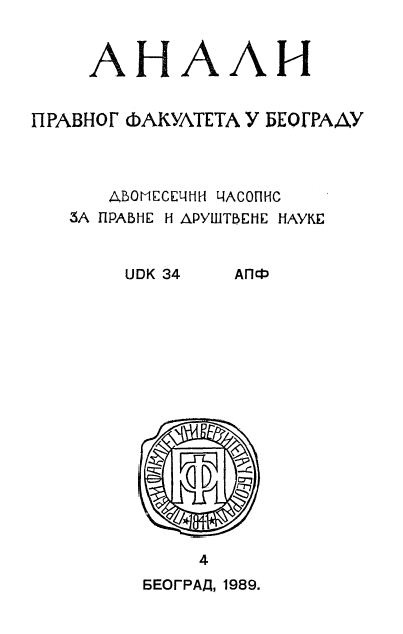НЕОЛИТСКА РЕВОЛУЦИЈА И ПОДРЕЂЕН ПОЛОЖАЈ ЖЕНЕ
NEOLITHIC REVOLUTION AND INFERIOR STATUS OF WOMAN
Author(s): Jacques-Henri MichelSubject(s): Anthropology, Prehistory
Published by: Правни факултет Универзитета у Београду
Summary/Abstract: The topic of this article is a frequently discussed one — the roots of inferior position of woman in the early history. By using anthropology and linguistics new elements are searched for the causes of deterioration of that position in course of the Neolithic. Even in societies without exchange of goods and differences in property status, the position of woman may have specific characteristics, as is the case of Aborigènes in Australia where woman participates in some cults together with men, but is excluded from others with a tendency of widening that exclusion. Woman is given as a pledge for solidarity and peace and a kind of guarantee for adhering to peace. While comparing the relationship between sexes in Euro-Asian societies and those in the New World (North and South Americas), one can see that the position of woman is considerably better with the „Indians", which is witnessed by the case of Cherokees where women enjoy relative sexual and social freedoms. One of the causes is related to early economy and domestication of cattle, especially the large-size one, which in Roman law falls under the res mancipi regime. Americas did not have such kind of cattle, except lama, while horse, donkey and mule were very useful in economy and war at Euro-Asian peoples. Since such animals require strong masculine hand, the reputation of men was based on this fact, too. This explains the conspicuous difference in the position of woman at the two groups of peoples. Before domestication of cattle, primitive societies knew of high level of equality and democracy which inlcudes relations between men and women. Consequently, it is necessary to provide in contemporary societies, too, in order to achieve democracy and equality between the sexes, the right for everyone to speak freely, equal property rights for women, admitting them to political decision-making, etc. However, this is going to be rather difficult in contemporary oppressive and masculine civilization. The article is full of valuable information concerning original democracy, relationship between sexes, mentality of American Indians, especially Cheyennes. Literature referred to is also rich, such as works by A.P. Elkin, Claude Levy-Strauss, Marcel Mauss, and Germaine Tillion.
Journal: Анали Правног факултета у Београду
- Issue Year: 37/1989
- Issue No: 4
- Page Range: 309-320
- Page Count: 12
- Language: Serbian

